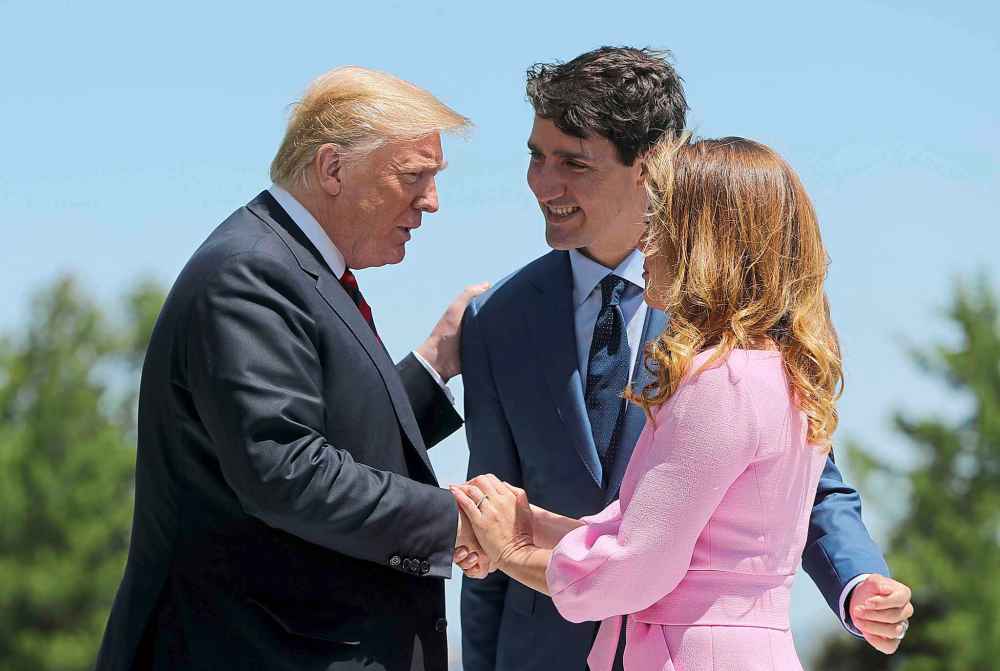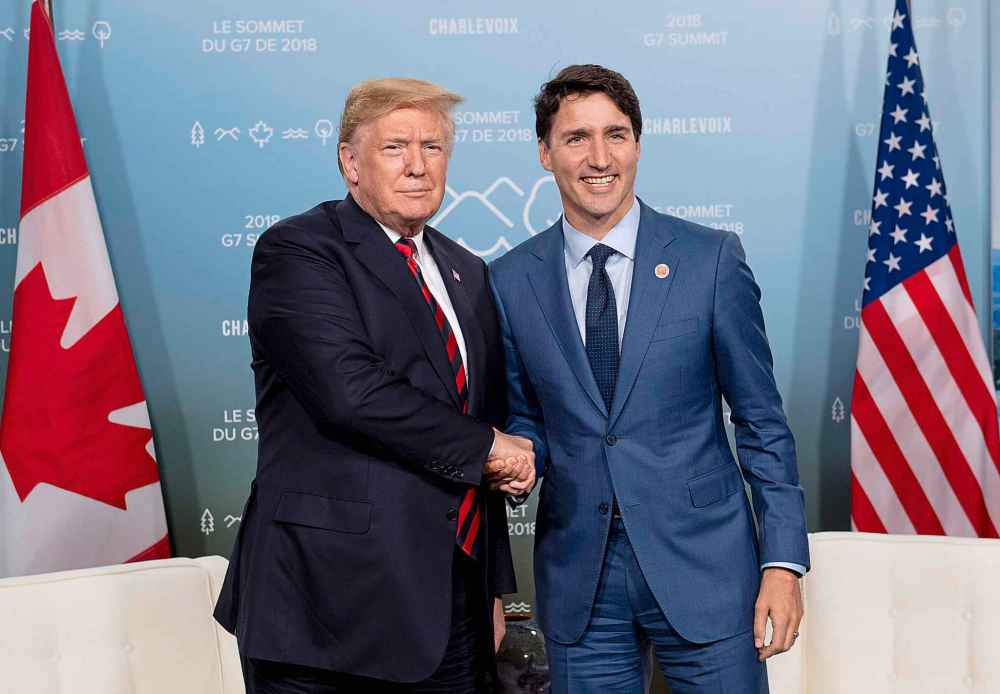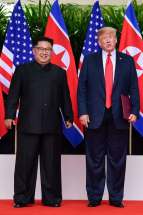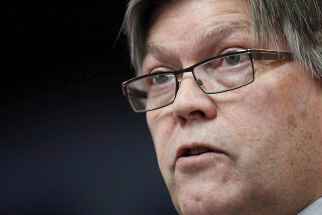Trudeau gains political payoff from getting Trumped
Read this article for free:
or
Already have an account? Log in here »
To continue reading, please subscribe:
Monthly Digital Subscription
$0 for the first 4 weeks*
- Enjoy unlimited reading on winnipegfreepress.com
- Read the E-Edition, our digital replica newspaper
- Access News Break, our award-winning app
- Play interactive puzzles
*No charge for 4 weeks then price increases to the regular rate of $19.00 plus GST every four weeks. Offer available to new and qualified returning subscribers only. Cancel any time.
Monthly Digital Subscription
$4.75/week*
- Enjoy unlimited reading on winnipegfreepress.com
- Read the E-Edition, our digital replica newspaper
- Access News Break, our award-winning app
- Play interactive puzzles
*Billed as $19 plus GST every four weeks. Cancel any time.
To continue reading, please subscribe:
Add Free Press access to your Brandon Sun subscription for only an additional
$1 for the first 4 weeks*
*Your next subscription payment will increase by $1.00 and you will be charged $16.99 plus GST for four weeks. After four weeks, your payment will increase to $23.99 plus GST every four weeks.
Read unlimited articles for free today:
or
Already have an account? Log in here »
Hey there, time traveller!
This article was published 12/06/2018 (2743 days ago), so information in it may no longer be current.
There is a theory in politics that one of the best ways a beleaguered political leader can win back support is to declare war on some other country.
History will show that military conflict tends not unite nations behind a common goal, but tends to mask weakness and incompetence, making even the most hapless leaders look strong and decisive.
Now, Prime Minister Justin Trudeau hasn’t declared war on anyone. And although he’s had a rough six months — a period in which his Liberal government has lost a significant measure of public support — he hasn’t quite earned the “hapless” label, yet. Nonetheless, he appears poised to reap political dividends from his sudden and bitter war of words with U.S. President Donald Trump.

Months of tense negotiations on trade between Canada and the U.S., largely over Trump’s demands to completely reconstruct the North American Free Trade Agreement, bubbled over at last weekend’s G-7 leaders’ summit in Quebec in spectacular fashion.
From the outset, Trump played the role of petulant disruptor at the G-7, arriving late, missing part of a session on gender equality, skipping a session on climate change, leaving the summit early, and otherwise doing what he does best, which is creating confusion.
After Trudeau’s summit-ending news conference, in which he repeated his promise to respond in kind to punitive tariffs on Canadian exports, Trump erupted, calling Trudeau “dishonest and very weak.” Trump’s White House trade advisor Peter Navarro, went a step further, asserting that there is a “special place in hell” for Trudeau.
On Tuesday, Trump upped the rhetoric when he took time out from his North Korean summit to threaten that the U.S. will punish “the people of Canada” for Trudeau’s temerity.
It is not entirely clear what set Trump off. He did not want to attend the G-7, preferring instead to prepare for the summit meeting with North Korean leader Kim Jong Un. Most observers believe that Trudeau has been very consistent in his comments on recently imposed U.S. tariffs, both in private with other G-7 leaders and in public.
How have Canadians responded to Trudeau’s role in what is an unprecedented public row with our most important trading partner? The reviews are not entirely in yet, but early returns suggest that this is fast becoming a political win for Trudeau.
The House of Commons unanimously passed a resolution, introduced by the NDP, condemning Trump and the U.S. for its comments and provocative trade policies. The support for Trudeau extended across party lines, with opposition parties pledging their support for Trudeau against Trump’s bully tactics.
Even Premier-designate Doug Ford of Ontario, a conservative populist who is about as far ideologically from Trudeau as a politician can get, said he stands “shoulder to shoulder” with the prime minister in his battle with Trump.
Internationally as well, there was support for Trudeau from the other G-7 leaders, many of whom share a common fear of punitive U.S. tariffs. German Chancellor Angela Merkel, French President Emmanuel Macron and British Prime Minister Theresa May all criticized Trump’s about-face at the G-7 and his selfish attempts to dismantle international fair trade agreements.
How will this support affect the political environment back in Canada?
Being ignored or slighted by the U.S. can be the kiss of death for a sitting prime minister. Former first minister Jean Chretien suffered a horrible humiliation when then-President George W. Bush named Great Britain as America’s most important ally in the wake of the 9-11 terrorist attacks. In Canada, that slight really signalled the beginning of the downward portion of Chretien’s career, and made him look weak and unimportant.

But what about when a sitting president lustily attacks and insults a prime minister? It’s looking more and more likely that Trump’s attack will boost Trudeau’s political fortunes at home.
The prospect that Trudeau might benefit politically from a fight with Trump could not have come at a better time.
Just over a year away from the next federal election, the Trudeau government is showing wear and tear. Controversies, such as the botched state visit to India last year and the more recent decision to purchase the Kinder-Morgan pipeline to ensure it would be completed, have left Trudeau and the Liberals ripe for criticism and bleeding support.
The Nanos Research power index, which consistently produces the most reliable polling snapshots of federal voting intentions, has Trudeau’s Liberals and Andrew Scheer’s Conservatives in a virtual dead-heat. The results of the most recent power index covers the week ending June 8, which is pretty much when the G-7 got underway. Nanos poll results over the next two weeks will most certainly show whether there are political gains to be made from scrapping with Trump.
No one is quite sure how many of Trump’s threats will come to fruition; the president has shown a tendency to talk tough on trade and then back away from the most contentious proposals at the last moment. That sets up the possibility that Trudeau could win twice in the battle with Trump: once for standing up to the president; and again if Trump backs down on some of his more punitive trade policies.
For now, it’s all-out verbal war with the U.S., with Canada’s export economy hanging in the balance.
War is hell, of course, unless it’s the best thing to happen to you in a long while.
dan.lett@freepress.mb.ca

Born and raised in and around Toronto, Dan Lett came to Winnipeg in 1986, less than a year out of journalism school with a lifelong dream to be a newspaper reporter.
Our newsroom depends on a growing audience of readers to power our journalism. If you are not a paid reader, please consider becoming a subscriber.
Our newsroom depends on its audience of readers to power our journalism. Thank you for your support.







